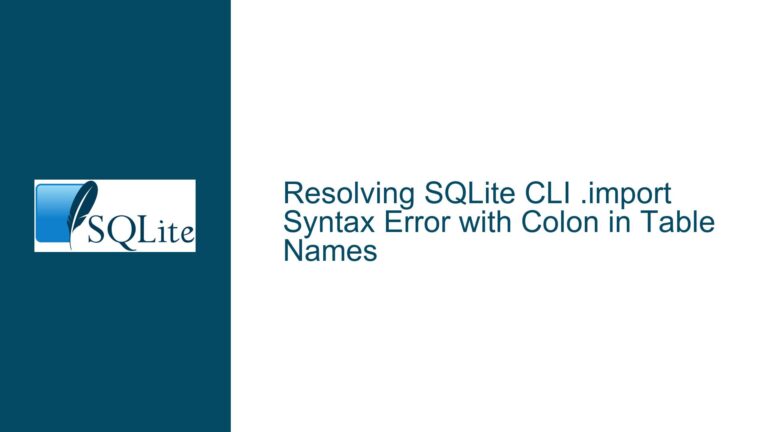Overriding SQLite Functions: Partial Overrides and Operator Overloading Challenges
Issue Overview: Partial Function Overrides and Operator Overloading in SQLite
The core issue revolves around the ability to partially override SQLite functions, specifically the -> and ->> operators, to handle different data types differently. The user wants to implement a custom behavior for these operators when the left operand is a BLOB, while retaining the default behavior for TEXT operands. This requires a deep understanding of SQLite’s function overloading mechanism, its limitations, and how operators are implemented internally.
SQLite allows users to define custom functions using the sqlite3_create_function API. However, the ability to overload functions is constrained by the number of parameters and text encoding (UTF-8 vs. UTF-16). SQLite does not support overloading based on runtime data types, which complicates the task of partially overriding functions like -> and ->>. These operators are internally implemented as functions, but their behavior cannot be selectively overridden based on the data type of the operands.
The user also explores the possibility of calling the default implementation of a function from within an overridden version, which would avoid code duplication. However, this approach is not straightforward due to the lack of exposed APIs for accessing the original function implementations and managing their lifecycle.
Possible Causes: Limitations in SQLite’s Function Overloading Mechanism
The primary cause of the issue lies in SQLite’s design philosophy, which prioritizes simplicity and lightweight operation over extensive customization. SQLite’s function overloading mechanism is intentionally limited to prevent complexity and ensure predictable behavior. Functions can be overloaded based on the number of arguments and text encoding, but not based on runtime data types. This limitation is rooted in SQLite’s dynamic typing system, where data types are determined at runtime rather than at compile time.
Another contributing factor is the lack of APIs for accessing and managing the original implementations of built-in functions. While SQLite provides the sqlite3_create_function API for defining custom functions, it does not expose mechanisms for retrieving or invoking the original implementations of built-in functions. This makes it challenging to extend or modify the behavior of existing functions without duplicating their code.
The user’s desire to handle BLOB operands differently from TEXT operands highlights a gap in SQLite’s functionality. While SQLite provides robust support for JSON and other data formats, it does not offer built-in mechanisms for customizing the behavior of operators based on data types. This limitation forces users to either duplicate the existing function implementations or resort to workarounds, such as using separate database connections or prepared statements.
Troubleshooting Steps, Solutions & Fixes: Strategies for Partial Function Overrides and Operator Customization
To address the issue of partially overriding SQLite functions and customizing operator behavior, several strategies can be employed. Each approach has its trade-offs and should be chosen based on the specific requirements and constraints of the application.
1. Complete Override with Runtime Type Checking
The most straightforward approach is to completely override the -> and ->> operators and implement runtime type checking within the custom function. This involves using the sqlite3_value_type API to determine the data type of the operands and branching the logic accordingly.
static void custom_json_extract(sqlite3_context *context, int argc, sqlite3_value **argv) {
if (sqlite3_value_type(argv[0]) == SQLITE_BLOB) {
// Custom logic for BLOB operands
} else {
// Default logic for TEXT operands
}
}
sqlite3_create_function(db, "->", 2, SQLITE_UTF8, NULL, custom_json_extract, NULL, NULL);
This approach ensures that the custom behavior is applied only when the left operand is a BLOB, while retaining the default behavior for other data types. However, it requires duplicating the logic for handling TEXT operands, which can lead to code redundancy and maintenance challenges.
2. Using Separate Database Connections for Default Implementations
Another approach is to use a separate database connection to invoke the default implementations of the -> and ->> operators. This involves preparing and executing SQL statements that call the built-in functions and passing the results back to the custom function.
static void custom_json_extract(sqlite3_context *context, int argc, sqlite3_value **argv) {
sqlite3 *default_db;
sqlite3_open(":memory:", &default_db);
const char *sql = "SELECT ?1 -> ?2";
sqlite3_stmt *stmt;
sqlite3_prepare_v2(default_db, sql, -1, &stmt, NULL);
sqlite3_bind_value(stmt, 1, argv[0]);
sqlite3_bind_value(stmt, 2, argv[1]);
if (sqlite3_step(stmt) == SQLITE_ROW) {
sqlite3_result_value(context, sqlite3_column_value(stmt, 0));
}
sqlite3_finalize(stmt);
sqlite3_close(default_db);
}
sqlite3_create_function(db, "->", 2, SQLITE_UTF8, NULL, custom_json_extract, NULL, NULL);
This approach avoids duplicating the logic for handling TEXT operands but introduces additional complexity and overhead due to the need for a separate database connection and prepared statements. It also requires careful management of database connections and error handling.
3. Exposing C API Functions for JSON and Record Formats
A more advanced approach involves exposing C API functions for handling JSON and record formats, which can be used both within SQL code and in C code. This requires implementing custom functions that provide the necessary functionality and integrating them into the application.
static void custom_json_extract_blob(sqlite3_context *context, int argc, sqlite3_value **argv) {
// Custom logic for BLOB operands
}
static void custom_json_extract_text(sqlite3_context *context, int argc, sqlite3_value **argv) {
// Default logic for TEXT operands
}
sqlite3_create_function(db, "json_extract_blob", 2, SQLITE_UTF8, NULL, custom_json_extract_blob, NULL, NULL);
sqlite3_create_function(db, "json_extract_text", 2, SQLITE_UTF8, NULL, custom_json_extract_text, NULL, NULL);
This approach provides greater flexibility and avoids the need for duplicating logic or using separate database connections. However, it requires significant effort to implement and maintain the custom functions, and it may not be suitable for all use cases.
4. Leveraging SQLite’s Extension Mechanism
SQLite’s extension mechanism can be used to create custom extensions that provide the desired functionality. This involves writing a custom extension that implements the -> and ->> operators with the desired behavior and loading it into the database.
#include <sqlite3ext.h>
SQLITE_EXTENSION_INIT1
static void custom_json_extract(sqlite3_context *context, int argc, sqlite3_value **argv) {
if (sqlite3_value_type(argv[0]) == SQLITE_BLOB) {
// Custom logic for BLOB operands
} else {
// Default logic for TEXT operands
}
}
int sqlite3_extension_init(sqlite3 *db, char **pzErrMsg, const sqlite3_api_routines *pApi) {
SQLITE_EXTENSION_INIT2(pApi)
sqlite3_create_function(db, "->", 2, SQLITE_UTF8, NULL, custom_json_extract, NULL, NULL);
return SQLITE_OK;
}
This approach provides a clean and modular way to extend SQLite’s functionality, but it requires knowledge of SQLite’s extension API and may not be suitable for all environments.
5. Combining Multiple Approaches
In some cases, a combination of the above approaches may be the most effective solution. For example, a custom function could be used to handle BLOB operands, while a separate database connection could be used to invoke the default implementation for TEXT operands. This hybrid approach allows for greater flexibility and can be tailored to the specific requirements of the application.
static void custom_json_extract(sqlite3_context *context, int argc, sqlite3_value **argv) {
if (sqlite3_value_type(argv[0]) == SQLITE_BLOB) {
// Custom logic for BLOB operands
} else {
sqlite3 *default_db;
sqlite3_open(":memory:", &default_db);
const char *sql = "SELECT ?1 -> ?2";
sqlite3_stmt *stmt;
sqlite3_prepare_v2(default_db, sql, -1, &stmt, NULL);
sqlite3_bind_value(stmt, 1, argv[0]);
sqlite3_bind_value(stmt, 2, argv[1]);
if (sqlite3_step(stmt) == SQLITE_ROW) {
sqlite3_result_value(context, sqlite3_column_value(stmt, 0));
}
sqlite3_finalize(stmt);
sqlite3_close(default_db);
}
}
sqlite3_create_function(db, "->", 2, SQLITE_UTF8, NULL, custom_json_extract, NULL, NULL);
This approach combines the benefits of runtime type checking and separate database connections, providing a flexible and maintainable solution. However, it also introduces additional complexity and should be carefully evaluated based on the specific requirements of the application.
Conclusion
The challenge of partially overriding SQLite functions and customizing operator behavior is a complex one, rooted in SQLite’s design philosophy and limitations. While there is no single solution that fits all use cases, a combination of runtime type checking, separate database connections, custom C API functions, and SQLite’s extension mechanism can provide effective workarounds. Each approach has its trade-offs, and the choice of solution should be guided by the specific requirements and constraints of the application. By carefully evaluating the available options and implementing the most suitable strategy, it is possible to achieve the desired functionality while maintaining the simplicity and reliability that SQLite is known for.






